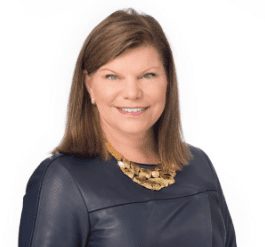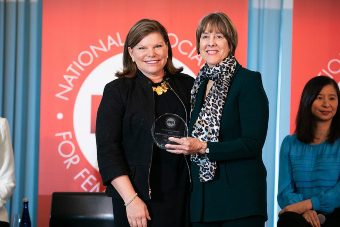
Last year, Accenture executive Annette Rippert was recognized as the National Association of Female Executives’ STEM Champion in Technology, honoring her work in helping women and girls succeed in science, technology, engineering and math.
Rippert, who leads Accenture Technology in North America, sits on the company’s Technology Leadership Council, a role that includes recruiting more women into technology roles. Beyond Accenture, Rippert has cultivated programs for women with partners and clients including Microsoft, Amazon Web Services and Capital One. She also helps bolster the next generation of STEM women through work with Northwestern University School of Engineering.
WashingtonExec recently spoke with Rippert about how her passion for helping women in STEM has developed into a hallmark of her career.
This Q&A has been condensed and edited for clarity.
When did you first become interested in STEM outreach programs as a part of your professional career?
Certainly as early as my days as an undergrad at Northwestern University, where I developed academically and personally. It wasn’t easy being one of a very few women engineering majors, but the lessons I learned there in navigating the current to change the current have stayed with me for a very long time.
My interest grew from there in part because of the tremendous opportunities to learn and grow I found professionally in this field. My passion for helping women in STEM careers has been a hallmark of my career. I’ve taken a personal interest to mentor more than 100 women within and outside of Accenture; I’ve cultivated programs for young and professional women sponsored by Accenture or together with our like-minded partners and clients such as Microsoft, Amazon Web Services and Capital One.
I also have sponsored programs for the networking and development of peer-level senior female executive leaders by hosting well-known women leaders like Condoleezza Rice, Maggie Wilderotter and Indra Nooyi to share their unique perspectives. I actively participate at the Grace Hopper Women in Computing Event, Girls Who Code, Code.org and Accenture’s apprenticeship programs. It is personally rewarding to be able to give back.

You serve on Northwestern University’s Engineering Advisory Board. Why do you choose to spend your spare time giving back to college students?
When I was studying for my engineering degree at Northwestern, I was one of a handful of women in the program, and that was certainly daunting. I have never been intimidated by that type of scenario, but I know it’s not an easy scenario for many women.
As I moved into the corporate world, I struggled to find female mentors as well. Luckily, there were a couple of male mentors who took me under their wing. As you know, mentors can be difference makers along your career path and this is the main reason why I feel it’s so important to be a mentor to others.
I try to leverage my role on Northwestern’s McCormick School of Engineering Advisory Board to develop pathways for future engineers — and especially future FEMALE engineers. Northwestern was a great place for me; it gave me a great education, encouraged my love of math and analytics and is very receptive and active in turning recommendations from the advisory board into reality for the benefit of all students.
What’s Accenture’s philosophy in working to bridge STEM gaps? Has that evolved over the last couple of years with you and your team’s involvement?
Accenture has invested in a number of partnerships with organizations dedicated to encouraging young women to choose STEM careers, including Girls Who Code and Code.org. In conjunction with Computer Science Education Week (Dec. 3-9), Accenture expanded its coding tutorial that is used to support Hour of Code to be accessible in 15 languages . . . to raise awareness and interest in coding to more students around the world through lessons in their native languages.
Accenture believes very strongly in the power of internships and the need to create and grow apprenticeship programs. For Americans and our economy to thrive, our workers need the education and training required to fill the digital economy jobs of today and tomorrow.
Unless businesses, government and communities come together, we risk leaving entire generations of Americans without work or the skills to acquire it. No one entity can fill the gap on its own. Instead, companies, governments, academia and nonprofits should work together to create partnerships that focus on K-12 education, reskilling and apprenticeships.
Accenture’s apprenticeship program provides underrepresented groups with greater access to digital-economy jobs. Diversity makes us stronger, smarter and more innovative, and it’s our goal to expand the pipeline of diverse talent. We piloted our first U.S. apprenticeship program in Chicago in 2016. By the yearend, we will have more than 100 apprenticeships, with plans to continue to grow the program next year.
Bottom line, what are some misconceptions about the STEM pipeline and how your organization (or you personally) is involved in managing our local STEM pipeline?
We have certainly come a long way in making it more appealing and less daunting for girls and women to pursue an education and a career in STEM. I think women have had opportunities, but the barriers have been around education, perception, traditional gender roles, and the cultural mentality in the workplace as well. Over the last two decades, we’ve seen an enormous evolution in all these challenges.
Accenture published research two years ago called “Cracking the Code,” and while that might seem ages ago, the results are still relevant and compelling. We took a deep look at why we have such gender disparity in STEM, and the findings were eye-opening. We discovered that girls start out equally interested in STEM as boys, but when they get into high school and college levels, that drops off significantly.
The reasons we found weren’t for lack of interest; they were instead around not having female teachers, not having female role models, and a general sense of pressure by female peers that STEM just wasn’t cool.
I’m very fortunate in that my personal commitment to STEM and women in STEM mirrors the commitments Accenture has made, most notably in sponsoring and scaling Accenture’s pioneering apprenticeship program to provide under-represented groups access to digital economy jobs and promoting Accenture’s agenda with important organizations driving change for women in STEM fields such as the Anita Borg Institute and many others.
WashingtonExec is hosting the annual K-12 STEM Symposium on March 30, 2019. The event is free and open to the public, but attendees are asked to register in advance.

